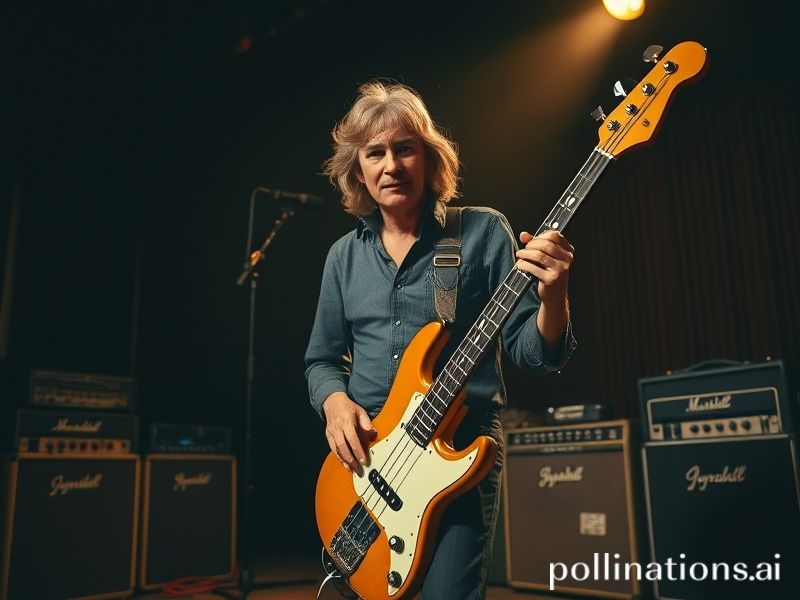John Deacon: The Silent Bass Diplomat Who Wired the World and Then Ghosted History
John Deacon: The Quiet Man Who Wired the World’s Last Great Rock Band and Then Vanished Like a Diplomatic Bag in Foggy Geneva
By the time most mortals reach the age of 27, they are either climbing the corporate cheese grater or posting inspirational quotes in Comic Sans. John Deacon, meanwhile, had already soldered together the bass line that would soundtrack half the planet’s revolutions, weddings, and questionable karaoke choices. In 1971, a soft-spoken electrical-engineering student from Leicester plugged in a homemade amp, looked at Freddie Mercury’s sequined silhouette, and decided that the universe’s biggest problem was not enough bottom end. The cosmic shrug that followed is still echoing through stadiums from Buenos Aires to Baku.
The international press—when it was still drunk enough on typewriter ribbon—liked to call Queen “Britain’s most exportable monarchs since Victoria.” What they missed was that Deacon was the one quietly engineering the actual balance of payments. While the band’s logo was being painted on the Berlin Wall’s western side like a taunt, Deacon’s bass lines were slipping through Checkpoint Charlie on cassette tapes smuggled next to Marlboros and Levi’s. In effect, the man became a one-man cultural IMF: injecting liquidity into the Cold War in the form of four-string hooks, collecting interest in screaming teenagers.
It’s easy to forget that “Another One Bites the Dust”—the song your uncle still uses as ringtone evidence of his “wild years”—was engineered by the shyest member of the group. Deacon sampled Chic’s disco DNA, spliced it with Motown muscle, and accidentally produced a track that would ricochet from Manila discos to Soweto shebeens. The CIA allegedly studied its bass frequency to see if it could crumble concrete (it couldn’t, but it did make several dictatorships dance themselves into early elections). Even the Soviet Ministry of Culture, a body allergic to anything above 110 BPM, stamped it “Acceptable for Young Engineers’ Social Evenings.” If soft power had a signature, it would be Deacon’s treble-clef scrawl.
Then, in 1997, he unplugged. Not the polite retirement of a statesman, but the full-blown disappearing act of an intelligence asset whose cover is blown. No farewell tour, no Vegas residency, no Netflix documentary featuring drone shots of his herb garden. The man simply walked off the geopolitical stage like a spy who’s just swapped passports in a Zurich train-station bathroom. The remaining members still cash arena checks the size of Baltic GDPs, but Deacon’s absence hangs heavier than the dry ice: a ghost note felt more than heard. Try explaining to a Brazilian super-fan why the only living founder refuses to even Skype in for “Radio Ga Ga” clap-alongs and you’ll witness the kind of existential crisis normally reserved for UN climate summits.
Financial journalists occasionally trot out the notion that Deacon’s early investment in Queen’s publishing catalog makes him “the richest ghost in rock.” True enough—his cut reportedly funds a discreet life somewhere in southwest London, investing in low-volatility bonds and avoiding anything that smells like a reunion. Yet the real wealth is geopolitical. From Seoul karaoke boxes where office workers scream “I Want to Break Free” as catharsis against 60-hour weeks, to Nigerian wedding DJs dropping “Under Pressure” right before bride-price negotiations, Deacon’s frequencies have become a kind of reserve currency of shared delirium. When the global mood swings toward authoritarian nostalgia, a 1985 Live Aid bootleg still circulates like samizdat.
In the end, John Deacon proves the oldest diplomatic maxim: influence is most potent when it doesn’t bother showing up for the photo-op. While the rest of us broadcast every brunch, he slipped the surly bonds of celebrity and left behind only circuits, strings, and the faint smell of solder. Somewhere tonight a dictator’s teenage grandson is learning “Deacon’s Breakthru riff” on a knockoff Fender, unaware that the man who wrote it now finds more excitement in a properly balanced portfolio. The world keeps dancing; the ghost keeps counting interest. And that, dear reader, is how you win the Cold War without ever firing a pyrotechnic.







